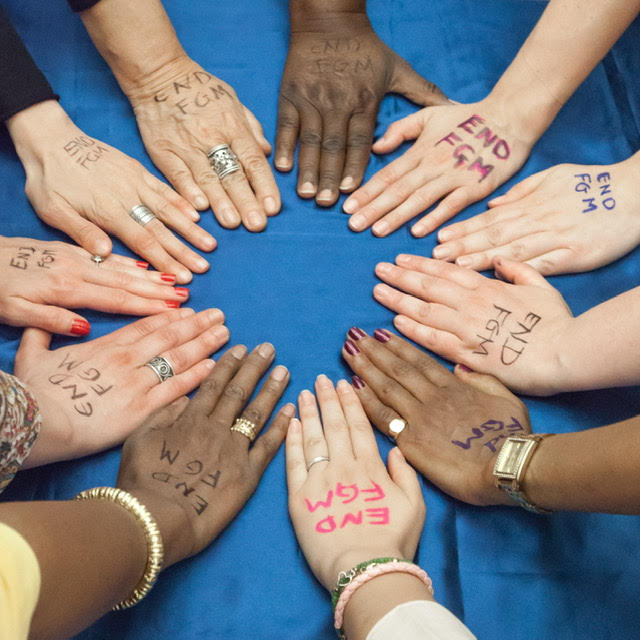The elimination of FGM has been called for by numerous inter-governmental organizations, including the African Union, the European Union and the Organization of Islamic Cooperation, as well as in three resolutions of the United Nations General Assembly.
Where FGM is carried out
Girls are sometimes taken abroad for FGM, but they may not be aware that this is the reason for their travel. Girls are more at risk of FGM being carried out during the summer holidays, as this allows more time for them to “heal” before they return to school.
If you think there’s a risk of this happening to you or someone you know, you can download the Statement Opposing FGM and take it with you on holiday to show your family.
Communities that perform FGM are found in many parts of Africa, the Middle East and Asia. Girls who were born in the UK or are resident here but whose families originate from an FGM practising community are at greater risk of FGM happening to them.
Communities at particular risk of FGM in the UK originate from:
OVER 80 percent
Djibouti, Egypt, Eritrea, Guinea, Mali, Somalia, Sudan, Malaysia and Sierra Leone
50-80 percent
Burkina Faso, Ethiopia, Gambia, Guinea-Bissau, Liberia, Oman, Indonesia and Mauritania
20-50 percent
Central African Republic, Chad, Cote D’ivoire, Burkino Faso, Kenya, Nigeria, Senegal and Yemen
LESS THAN 20 percent
Benin, Cameroon, Ghana, Iraq, Niger, Togo, Uganda, DRC, United Republic of Tanzania and Zaire.
FGM Prevalence Map – National FGM Centre
Please click here:
FGM map
There are four main types of FGM:
- Type I: Excision of the Prepuce with or without excision of part or all of the clitoris.
- Type II: Excision of the clitoris with partial or total excision of the labia minora and labia majora.
- Type III: Excision of part or all of the external genitalia and stitching and narrowing of the vaginal opening.
- Type IV: Other harmful procedures to the female genitals, including pricking, piercing, and cutting, scraping or burning the area.
The practice is mostly carried out by traditional circumcisers, using knives or razors.
Immediate complications can include:
- injury to surrounding genital tissue;
- severe pain;
- wound healing problems;
- shock;
- excessive bleeding;
- genital tissue swelling;
- fever;
- infections e.g., tetanus HV Hepatitis;
- urinary tract infections and problems passing urine.
Long-term consequences can include:
- sexual problems (pain during intercourse, decreased satisfaction, etc.);
- problems becoming pregnant;
- increased risk of childbirth complications (difficult delivery, excessive bleeding, caesarean section, need to resuscitate the baby, etc.) and new-born deaths;
- urinary problems (painful urination, urinary tract infections);
- menstrual problems (painful menstruations, difficulty in passing menstrual;
- scar tissue and keloid;
- vaginal problems (discharge, itching, bacterial vaginosis and other infections;
- need for later surgeries: for example, the FGM procedure that seals or narrows a vaginal opening (type 3) needs to be De-infibulated to allow for sexual intercourse and childbirth;
- psychological problems (flashbacks, depression, anxiety, post-traumatic stress disorder, low self-esteem, etc.);
- health complications of female genital mutilation.
Treatment for FGM (De- infibulation)
Surgery can be performed to open up the vagina, if necessary. This is called De-infibulation.
It’s sometimes known as a “reversal” although this name is misleading, as the procedure doesn’t replace any removed tissue, and will not undo the damage caused. However, it can help many problems caused by FGM.
Surgery may be recommended for:
- women who are unable to have sex or have difficulty passing urine as a result of FGM
- pregnant women at risk of problems during labour or delivery as a result of FGM
De-infibulation should be carried out before getting pregnant, if possible. It can be done in pregnancy or labour if necessary, but ideally should be done before the last two months of pregnancy.
De-infibulation Procedure
The surgery involves the opening of the scar tissue on the vulva until the urethral meatus is visible. The edge of the incision is over sewn with an absorbable material.
For pain relief it’s usually performed under local anaesthetic or epidural spinal. Its normally a day case. A small number of women need either a general anaesthetic which may involve a short stay in hospital.
Refers to the re-suturing (usually after childbirth) of the incised scar tissue of a woman with type 2 or 3 FGM. This procedure should not be carried out and it’s against the law.
Cultural and social factors for performing FGM (Source – W.H.O.)
The reasons why female genital mutilations are performed vary from one region to another as well as over time, and include a mix of sociocultural factors within families and communities. The most commonly cited reasons are:
- Where FGM is a social convention (social norm), the social pressure to conform to what others do and have been doing, as well as the need to be accepted socially and the fear of being rejected by the community, are strong motivations to perpetuate the practice. In some communities, FGM is almost universally performed and unquestioned.
- FGM is often considered a necessary part of raising a girl, and a way to prepare her for adulthood and marriage.
- FGM is often motivated by beliefs about what is considered acceptable sexual behaviour. It aims to ensure premarital virginity and marital fidelity. FGM is in many communities believed to reduce a woman’s libido and therefore believed to help her resist extramarital sexual acts. When a vaginal opening is covered or narrowed (type 3), the fear of the pain of opening it, and the fear that this will be found out, is expected to further discourage extramarital sexual intercourse among women with this type of FGM.
- Where it is believed that being cut increases marriageability, FGM is more likely to be carried out.
- FGM is associated with cultural ideals of femininity and modesty, which include the notion that girls are clean and beautiful after removal of body parts that are considered unclean, unfeminine or male.
- Though no religious scripts prescribe the practice, practitioners often believe the practice has religious support.
- Religious leaders take varying positions with regard to FGM: some promote it, some consider it irrelevant to religion, and others contribute to its elimination.
- Local structures of power and authority, such as community leaders, religious leaders, circumcisers, and even some medical personnel can contribute to upholding the practice.
- In most societies, where FGM is practised, it is considered a cultural tradition, which is often used as an argument for its continuation.
- In some societies, recent adoption of the practice is linked to copying the traditions of neighbouring groups. Sometimes it has started as part of a wider religious or traditional revival movement.
FGM is illegal in the UK.
It is an offence to:
- perform FGM (including taking a child abroad for FGM)
- help a girl perform FGM on herself in or outside the UK
- help anyone perform FGM in the UK
- help anyone perform FGM outside the UK on a UK national or resident
- fail to protect a girl for whom you are responsible from FGM
Anyone who performs FGM can face up to 14 years in prison. Anyone found guilty of failing to protect a girl from FGM can face up to seven years in prison.
Getting help and support
All women and girls have the right to control what happens to their bodies and the right to say no to FGM.
Help is available if you’ve had FGM or you’re worried that you or someone you know is at risk.
- If someone is in immediate danger, contact the police immediately by dialling 999.
- If you’re concerned that someone may be at risk, contact the NSPCC helpline on 0800 028 3550.
- The National FGM Centre number is 020 8498 7137.
- If you’re under pressure to have FGM performed on your daughter, ask your GP, health visitor or other healthcare professional for help, or contact the NSPCC helpline.
- If you’ve had FGM, you can get help from a specialist NHS gynaecologist or FGM service – ask your GP, midwife or any other healthcare professional about services in your area.
If you’re a health professional caring for a patient under 18 who has undergone FGM, you have professional responsibilities to safeguard and protect her.
Download the Statement Opposing FGM
The summer holidays are when many young girls are taken abroad, often to their family’s birth country, to have FGM performed. The FGM statement, also known as the FGM health passport, highlights the fact that FGM is a serious criminal offence in the UK.
If you’re worried about FGM, print out this statement, take it abroad with you and show it to your family. Keep the declaration in your passport, purse or bag, and carry it with you all the time.
Download the statement by clicking here:
https://www.gov.uk/government/publications/statement-opposing-female-genital-mutilation
The above link takes you to a page where you can also find the statement in other languages.
The Department of Health has published leaflets for people who want to know more about FGM. These are available in the following languages:
Mwy o wybodaeth am FGM – Welsh version (PDF, 164kb)
ስለኤፍጂኤምተጨማሪመረጃ – Amharic version (PDF, 472kb)
مزيد من المعلومات حول ختان الإناث – Arabic version (PDF, 228kb)
FGM اطلاعات بیشتر درباره – Farsi version (PDF, 207kb)
Renseignements complémentaires sur les MGF – French version (PDF, 167kb)
Macluumaad dheeraad ah ee ku saabsan FGM – Somali version (PDF, 170kb)
Habari zaidi kuhusu ukeketaji wa wanawake – Swahili version (PDF, 160kb)
ብዛዕባኤፍጂኤምተወሳኺሓበሬታ – Tigrinya version (PDF, 491kb)
ایف جی ایم کے بارے میں مزید معلومات – Urdu version (PDF, 235kb)
For further information on support you can receive from NHS Safeguarding:
Please click here.
And here.
For links to some informative films on this subject:
http://www.england.nhs.uk
http://www.gov.uk
Further reading:
Female Genital Mutilation
Female Genital Mutilation – the facts
For a list of useful contact details for The Portland Hospital, please click HERE.

DISCLAIMER
This article is for information only and should not be used for the diagnosis or treatment of medical conditions. Essential Parent has used all reasonable care in compiling the information from leading experts and institutions but makes no warranty as to its accuracy. Consult a doctor or other health care professional for diagnosis and treatment of medical conditions. For details
click here.

